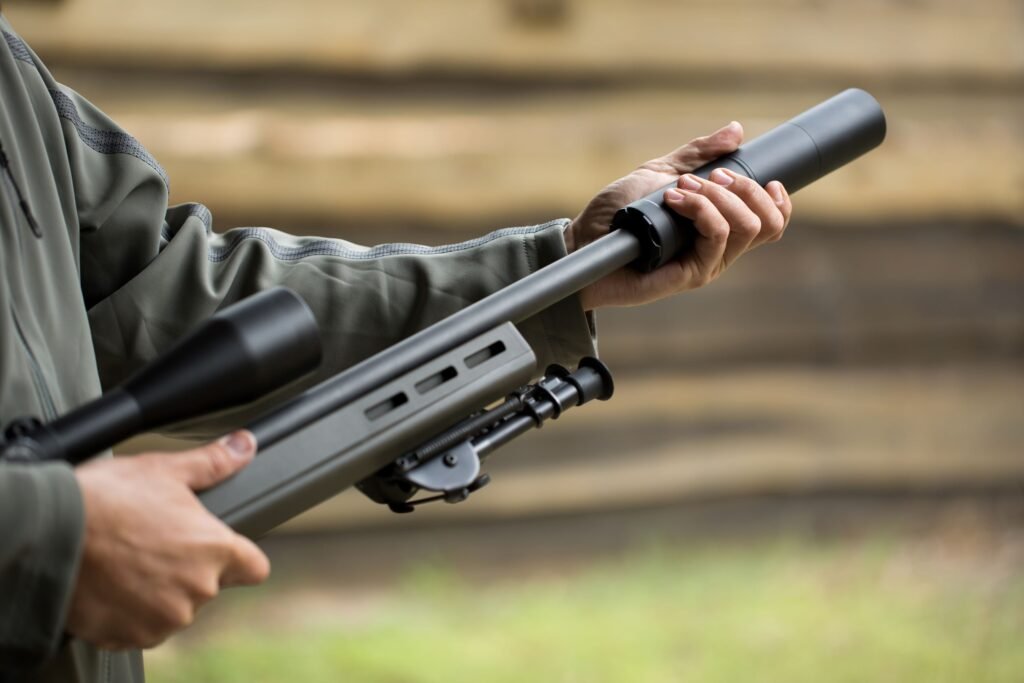Silencers are a staple of action movies, perhaps seeing the most use with renowned (but fictional) secret agent James Bond. His signature Walther PPK, first given to Bond in Dr. No to replace the Beretta that nearly killed him, came with a Brausch silencer. Though he would switch to the P99 in Tomorrow Never Dies, the PPK makes a comeback in Quantum of Solace.
The armory officer that issued the gun, Major Boothroyd, claims that the American CIA vouches for the firearm in getting covert jobs done. It isn’t unusual for gun owners to pick up silencers (or suppressors) to complete the secret agent experience. And before you ask, yes, you can own one legally. Here’s everything you need to know about silencers and how to get one.
The what and why
As the term implies, firearm silencers significantly reduce the sound of gunshots but don’t make them completely silent. Depending on several factors, such as the caliber and whether or not the bullet is subsonic, silencers can reduce the loudness of a gunshot by between 20 and 35 decibels (dB), as per the American Suppressor Association.
Given that it isn’t unusual for gunshots from small arms to be as loud as 140 dB, the reduction may not appear significant. However, it’s worth noting that every decrease of 10 dB means any sound will be ten times less loud. At ranges around 110 to 120 dB, firing a gun with a silencer attached will only be as loud as an ambulance’s siren, which is still manageable.
In real life, James Bond won’t be able to pull off wet works without being heard. That being the case, silencers see use in at least two situations.
- Mitigating noise pollution
According to the World Health Organization, any collection of sounds over 70 dB can be classified as noise pollution and a hazard to hearing. Firing a gun without proper hearing protection is a good way to suffer noise-induced hearing loss, a disorder that affects an estimated 12.5% of children and 17% of American adults.
- Self-defense
However, there are situations wherein you might not be able to wear protective gear, such as thwarting an ongoing crime in your home. Think about it: there’s no time to fetch your gear when you and your family are in danger. If you ever need to pull the trigger in self-defense, a silencer can reduce the deafening sound of a gunshot.
How to get one
Purchasing a firearm silencer would’ve been easier had the Hearing Protection Act become law. It would’ve removed silencers from the legal definition of a “firearm,” allowing for interstate sales of silencers. Unfortunately, the bill remains in limbo two years after being introduced in Congress, and an update is unlikely anytime soon.
Unless Congress shows a renewed interest in the bill, it falls on firearm dealers to streamline the process of buying a silencer. Among many dealers, the first step is answering a few questions, whether over the phone or on the dealer’s website. One of these questions is the type of silencer suitable for your firearm, as there’s no one-size-fits-all type.
The next step is getting a federal tax stamp, as silencers are still classified as “firearms” under the National Firearms Act (NFA). It has a fixed price tag of USD$200, which hasn’t changed since the NFA became law in 1934. You can buy the tax stamp straight from the dealer, though they may charge a small markup.
Due to the above reason, purchasing silencers requires purchasing an NFA gun trust. The trust declares the buyer as the primary owner of the silencer and allows them to declare other people as co-trustees, passing ownership to them when the primary owner dies.
Once the necessary paperwork is on hand, it’s time to fill out Form 4, issued by the Bureau of Alcohol, Tobacco, and Firearms (ATF). All ATF forms are paperless, so you need to go to the ATF’s eForms website to complete one. Once submitted, approval can take up to nine months, during which buyers can pay for their silencers in monthly installments while waiting.
Legality by state
Similar to gun ownership and concealed carry, silencer ownership is regulated at the state level. As of this publication, 42 states allow people to own silencers, with all except Connecticut and Vermont allowing their use while hunting.
The eight states that don’t allow silencer ownership are as follows: California, Delaware, Hawaii, Illinois, Massachusetts, New Jersey, New York, and Rhode Island. The District of Columbia also prohibits silencer ownership. Nevertheless, checking the state’s laws carefully before purchasing a silencer is highly advised.
Conclusion
Silent killing with silenced guns is purely artistic license, but that doesn’t make silencers any less useful. They can benefit gun owners by safeguarding their homes without going deaf or startling the entire neighborhood.





